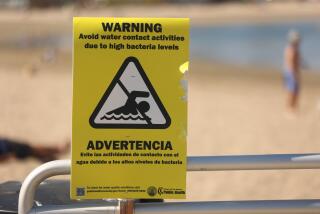Swimmer, Know Thyself
- Share via
Because beachgoing -- a Southern California delight -- can turn so deadly, it’s hard to fathom why so many folks who don’t know how to swim have plunged so deeply into the summer waters. They’re producing unseasonably high numbers of rescues. And there have been six drownings off the Orange County coast this year, already reaching last year’s total.
Why do romantics launch into surf as the day’s light dwindles, without being good swimmers and without a lifeguard present? Two of the young men who drowned in separate, tragic incidents in recent weeks -- a USC football recruit and a boogie boarder -- went to sea at dusk. They did so after a beach dinner with friends, apparently lured by unusually warm waters. Both men were weak swimmers, officials say, and they fell victim to riptides -- swift, powerful currents of brown, choppy water moving back to sea after washing up on the beach.
Riptides, factors in 80% of lifeguard rescues nationwide, cause many uninformed swimmers to panic. In the terror of seeing the shore fade from view, they struggle against the overpowering current until exhaustion -- or worse -- sets in.
Common sense and “uncommon knowledge” will safeguard beachgoers, says Capt. Eric Bauer, a 27-year veteran lifeguard at Newport Beach. Take steps as simple as: Know how to swim, be honest about how well you do so and know how to react to rip currents. Don’t try to swim straight back to shore. Instead, swim parallel to shore until out of the strong brown current and into calmer blue waters; then head for shore.
Lifeguards will happily inform swimmers, before they’re in the water, about rip currents and other hazards. It’s best to keep in sight of staffed guard stations; don’t swim after dusk. Go with a buddy and avoid unguarded beaches.
Safety officials offer one more warning: Watch out for shallow sandbars. They’ve caused neck injuries to rise -- quadrupling in July at Huntington City Beach compared with the previous July. These injuries -- which can damage the spinal cord and result in paralysis -- are preventable. Don’t dive headfirst into the water; keep an arm out in front while surfing to protect the neck; and avoid surfing straight over a wave (“over the falls”). Surf’s up, stay safe.
More to Read
Sign up for Essential California
The most important California stories and recommendations in your inbox every morning.
You may occasionally receive promotional content from the Los Angeles Times.










